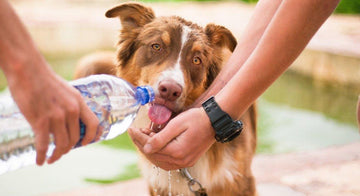
Kidneys carry out many essential tasks in maintaining your dog's overall health. They maintain proper fluid balance, filter waste products, and remove them from the body as urine. As natural body filters, they sift through the blood to remove excess water, salts, and waste minerals. They also help regulate blood pressure and produce hormones that aid red blood cell production and calcium metabolism.
Unfortunately, kidney health in pets is known to decline with age due to a decrease in nephrons—the filtering units of the kidneys. This can lead to issues such as chronic kidney disease (CKD) or chronic kidney failure, a condition where the kidneys gradually lose their ability to function.
Early Signs of Kidney Problems in Dogs
Kidney failure in dogs can lead to a buildup of waste products and fluid imbalances in the body. This can result in a range of symptoms, including increased thirst and urination, weight loss, lethargy, loss of appetite, vomiting, and a decline in coat quality. When left untreated, the condition may progress, and your dog may develop anemia and other potentially life-threatening complications.
These kidney issues underscore the importance of maintaining good kidney health in pets for their overall health and well-being, particularly as they age. Regular veterinary check-ups, a balanced and low-sodium diet, proper hydration, and minimizing exposure to toxins are key to maintaining a healthy lifestyle for your dog. Early detection through tests also allows for timely intervention and effective management of potential kidney issues.
Additionally, proper house training can indirectly contribute to maintaining kidney health by minimizing the risk of urinary tract infections and reducing unnecessary stress on the kidneys. Providing constant access to a toilet, such as a dog grass pee pad, helps prevent accidents and encourages dogs to urinate when necessary.

Potty Training & Other Ways to Maintain Healthy Kidney Function in Dogs
Starting as early as about nine months, training dogs as young puppies to consistently relieve themselves in appropriate places reduces the risk of urine-related issues like urinary tract infections, bladder stones, and other conditions affecting kidney function.
By encouraging your pet to urinate at scheduled times and in designated areas, you can ensure that their bladder is emptied regularly and the toxins are flushed out from the body. It also minimizes their holding their urine for long periods, which can stress their kidneys.
An indoor grass pad for dogs is a convenient potty training solution, providing a designated area for your pet to relieve themselves. Our Gotta Go Grass consists of natural grass that recreates the sensory experience dogs associate with potty, encouraging them to use the pad consistently. It has natural moisture and odor-absorbing properties to promote a sanitary environment and facilitate an easy clean-up. Overall, this creates a positive indoor potty experience and reinforces good potty habits when you house-train your dog.
Diet Management
A balanced diet is extremely important in maintaining your dog's health and preventing kidney-related issues. It should include an adequate amount of protein and less sodium intake, as excesses in these areas can lead to the accumulation of toxins in the blood and hypertension, respectively.
Maintain good fiber levels to promote digestive health and avoid foods like chocolate, grapes, and raisins, which can be poisonous for dogs.
Supplement with Omega-3 Fatty Acids
Add Omega-3 fatty acids to their diet, especially from fatty fish oil like salmon, sardines, and anchovies. As an anti-inflammatory supplement, it helps control inflammation, improve mobility by relieving stiff, aching joints, and aid wound healing. It
Avoid Too Much Phosphate
Excess phosphate in your dog's diet has been linked to kidney damage and other health issues. It's why avoiding high-phosphate foods, such as certain meats and processed foods, is essential for maintaining optimal kidney health. Signs of elevated phosphate are linked with high calcium and include increased water consumption, frequent urination, and tremors.

Increase Water Intake
Adequate water intake helps flush out toxins from the kidneys, preventing the formation of crystals and stones and supporting overall kidney function. Keep your dog well-hydrated by incorporating wet or canned food into their diet, which contains higher water content than dry kibble.
Place water bowls in easily accessible locations throughout the house to promote hydration, and make sure they are clean and refilled regularly. Monitor your dog to ensure they are drinking throughout the day, especially in warmer days.
Brush Dog's Teeth
Periodontal disease in dogs can increase the risk of renal failure as the bacteria from infected gums can enter through the bloodstream and infect other organs, including your dog's kidneys. Besides regular brushing, supplementing your effort with dental chews, toys, and diets specific to reducing tartar and plaque can help promote healthy dental habits and prevent periodontal disease.
Regular Monitoring
Regular veterinary checkups are essential for monitoring your dog's overall health and detecting early signs of kidney problems. During these checkups, your vet may perform tests to assess kidney function, identify potential health problems, and provide guidance on dog-safe medications, treatments, nutrition, and lifestyle. This proactive approach allows for early intervention, contributing to your dog's well-being.

Living a Healthy Life with Gotta Go Grass
Ensuring your dog's kidney health involves a holistic approach encompassing various aspects of dog care. From house training to regular vet visits, these foundation efforts can help dogs stay healthy and prevent issues like acute kidney failure. Additionally, proactive efforts such as increasing water intake, supplementing with omega-3, and proper diet management contribute significantly to their overall well-being.
As responsible pet owners, integrating these practices into your routine ensures that your beloved companion will lead a long, healthy life.




